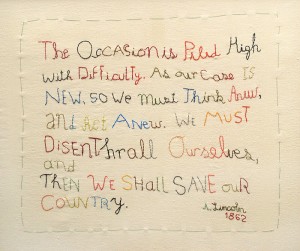Hey Whitmaniacs, here’s a shiver-inducer:
Today I was in C’ville for an appointment and when it was done, my traveling companion Professor Emerson and I decided to stretch our legs on the grounds of our alma mater. Professor Emerson has a friend who works in the new rare book facility, which I had not seen, and we stopped by to see him. Although we missed him for the day, we paused to look in a small display on the edge of the controlled rare book area. And (hold your slouch hats), I suddenly recognized the handwriting on two pieces of paper, each about 3×5 (one with ragged edges as though torn out): a hand-written manuscript of “When I Heard at the Close of Day,” in ink with WW’s revisions in pencil (description in the display: “autograph manuscript with pencilled and pasted corrections in author’s hand. 1857-1859”), the final lines of the poem squeezed near the bottom of the second page. Needless to say, I nearly shrieked, but instead read the poem aloud to Professor Emerson, who bravely offered to risk jail by using her cell phone as a camera in the controlled rare book space. Though I was perfectly willing to risk her freedom in pursuit of Walt, we both felt the manuscript would not photograph through the specialized glass, so instead you have only this, my testimonio, and will have to trust me that it was wonderful.


